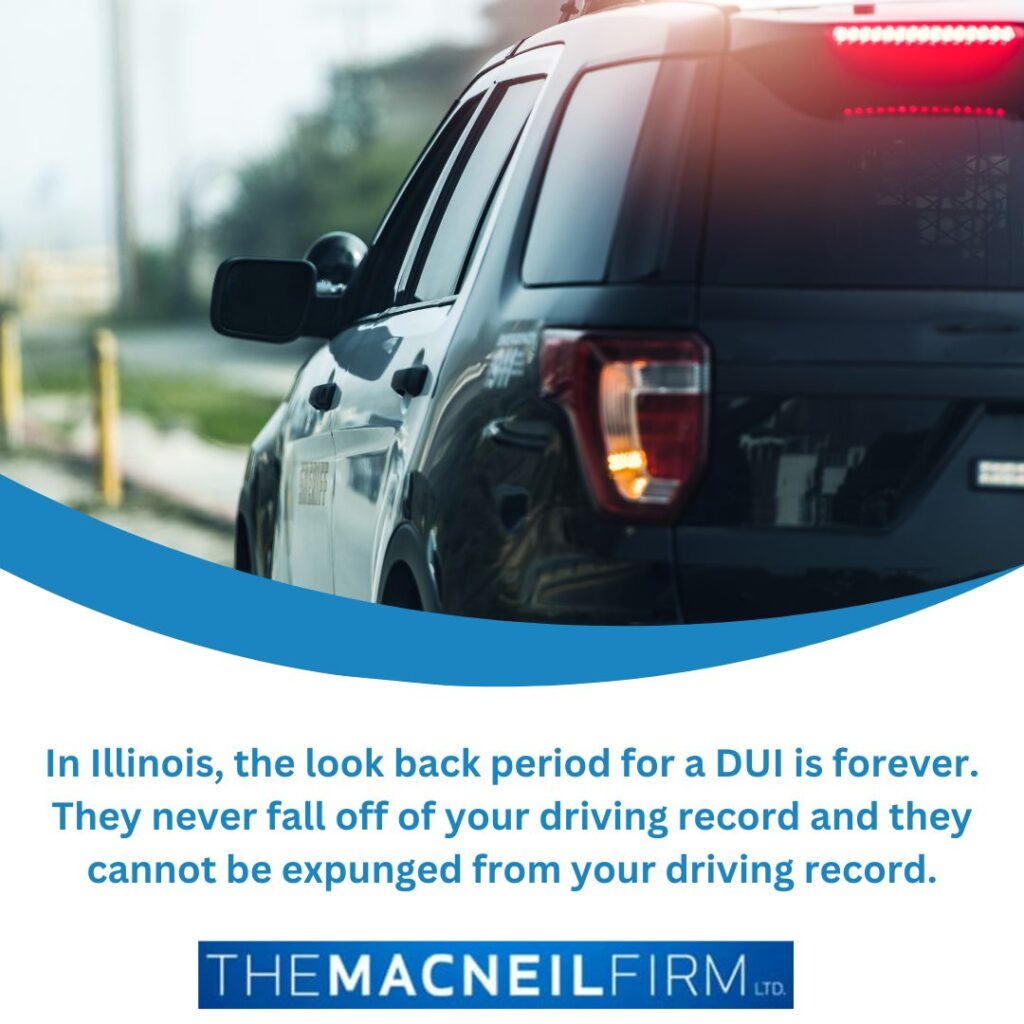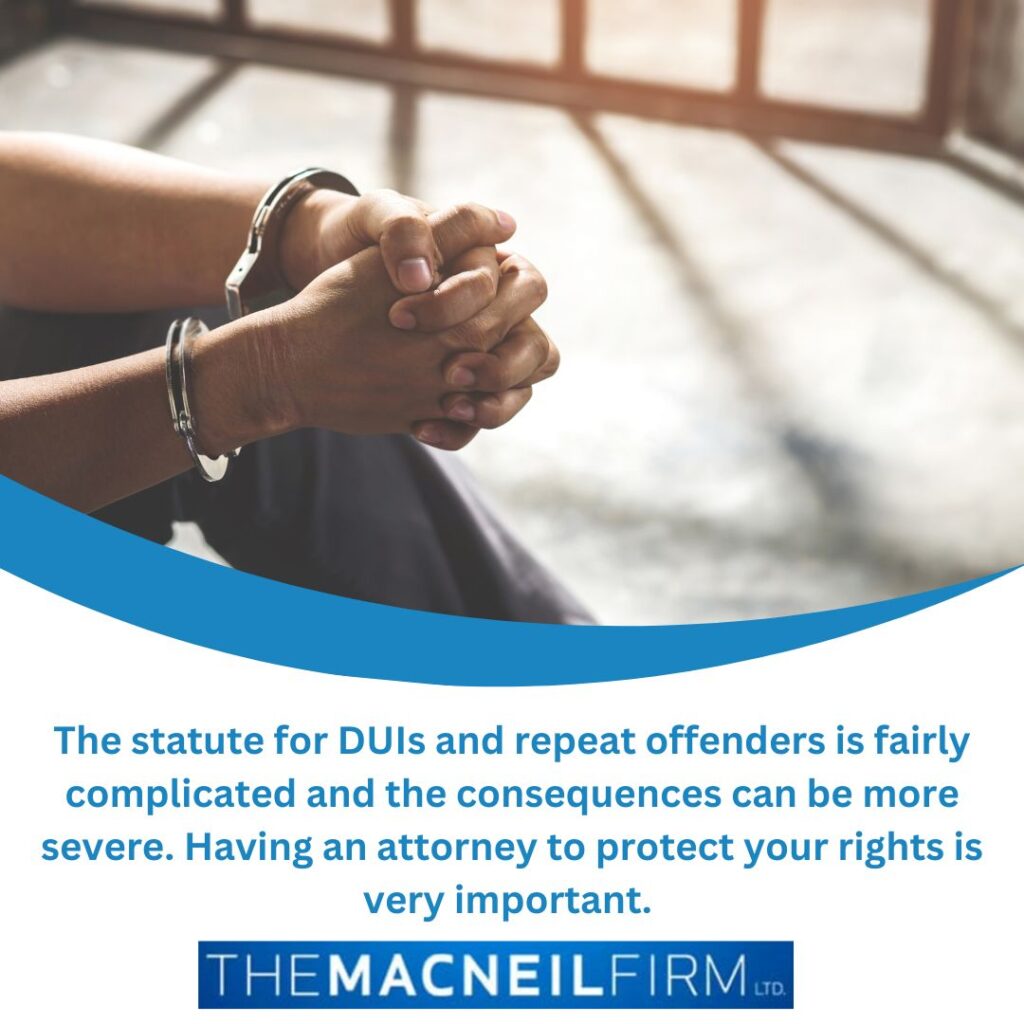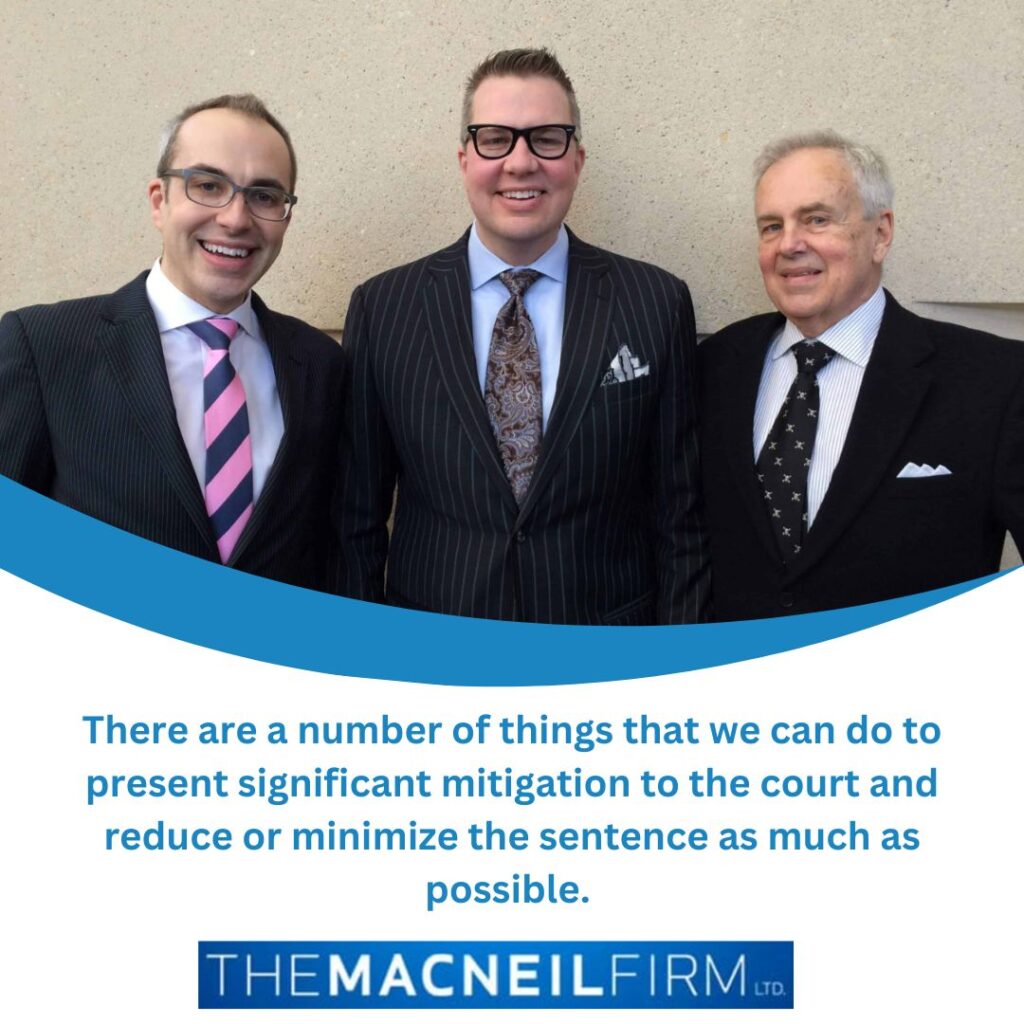In Illinois, the look back period for a DUI is forever; they never fall off of your driving record. DUIs cannot be expunged from your driving record. If you have repeat DUI offenses and need an experienced attorney, The MacNeil Firm is here for you. We represent repeat offenders quite often, which is unique because many attorneys only handle first offenders. Sometimes people have the unfortunate situation of being arrested in a short period of time for multiple DUIs. Other times, there are a number of years in between arrests. Our experience with repeat DUI offenses is significant. Contact us today to have attorneys on your side with experience and savvy to provide the best defense possible.
If you have previously plead guilty or are found guilty of a DUI, it will be reported to the Secretary of State, and it will appear on your driving record forever. This includes court supervision for a first DUI. Many lawyers tell their client that court supervision for a first DUI will not go on their record, but that statement is misleading. Court supervision is a special type of probation that if completed successfully, it will not be a judgment of conviction on your criminal record. However, it will appear as a DUI on your driving record forever. In Illinois, once a DUI is on your driving record, it stays there forever.
How DUI offenses are classified
In Illinois, the driving records show if you plead guilty or found guilty of DUI. Also, there is also a separate entry that shows if your license was suspended for either refusing a breath, blood or urine test, or if you were over the limit on one of those tests. Even if an individual was found not guilty at trial, their driving record would still show a summary suspension for refusing the breath test. Any prosecutor would be able to determine that there was some sort of a prior DUI arrest even if it did not result in a finding of a guilty verdict. That could impact or limit your options on a pending DUI case.
The statute for DUIs and repeat offenders is fairly complicated. A second DUI that has no other aggravating factors would still be a Class A misdemeanor, which means that it has a maximum jail sentence of one year and a maximum fine of $2,500, but there are other mandatory minimum sentences that a second offender would be subjected to. A second offender has a mandatory jail sentence of five days or two-hundred hours of community service for a second offense. If the breath or blood test shows a blood alcohol level over 0.16%, then there is an additional mandatory two days in jail, and an additional mandatory $1,250 fine.
A third DUI by statute can be charged as a felony aggravated DUI. That is a Class 4 felony. Possible penalties range from probation up to three years in prison. With the third DUI, if the blood alcohol level is over 0.16%, that is an additional mandatory ninety days in jail, and an additional mandatory $2,500 fine. A fourth DUI offense is an aggravated DUI. That is a non-probation Class 2 felony, which means that the judge does not have the power to give that individual probation, even if they wanted to. A person convicted of their fourth DUI has a mandatory prison sentence, and they must be sentenced from a period of three up to seven years.
A fifth DUI, similarly, is a non-probation Class 1 felony, which means there is no probation even if the judge wanted to give it to him. That is a mandatory four years up to a maximum of fifteen years in prison. A sixth DUI or more, that is what we call a Class X felony, which carries a mandatory of six years up to thirty years in prison. Repeat DUI offenses have more severe consequences. If you want to make sure your situation is resolved in the best way possible, you need our experienced legal team to help.
Alcohol treatment programs
Seeking alcohol treatment will almost never have a negative impact on the case, and it will frequently have a positive impact or help the case. If you feel like you need help with addiction, then definitely seek treatment from a qualified clinic. If it is out-patient treatment or classes, if it is in-patient rehab, they should do whatever they need to do in order to get healthy. If my clients do go to rehab, we will present it at the proper time and in a way that maximizes the benefit for my client. Although seeking alcohol or drug treatment will not be considered during trial, it can be considered after a finding of guilty, or during plea agreement negotiations.
Temporary Licenses and Interlock Devices
Generally, for repeat DUI offenses, if a client has not had a DUI within five years, they would be eligible for the MDDP – Monitoring Device Driving Permit during their summary suspension. If their license gets revoked from a second or third DUI conviction, that individual could be eligible for what is called an RDP – Restricted Driving Permit. However, the process for obtaining the RDP is fairly difficult. It requires the individual to get an updated alcohol evaluation, and follow all that recommended treatment.
The individual must then appear before Secretary of State Hearing Officer where a hearing is conducted for the State to determine whether or not they want to grant any sort of driving privileges. After the hearing, a ruling is issued. If they grant driving privileges, usually before they reinstate full driving privileges, that individual will be granted an RDP. Basically, it is driving for work and things like that. Generally, that would require that ignition interlock device as well.
An ignition interlock device or sometimes they call it a BAIID (Breath Alcohol Ignition Interlock Device). It is basically a breathalyzer that is installed in your car. You have to blow in it in order to start the vehicle. You are also required to blow into the machine at various times while you are driving. This device is required to get that MDDP – Monitoring Device Driving Permit, during your summary suspension. As far as multiple offenders, it also could be required if you are granted some restricted driving privileges after your license was revoked for a DUI.
Contact our attorneys for representation with repeat DUI offenses
All of my strategies and techniques that I have produced excellent results with on first DUIs, are just as effective on a second, third or fourth DUI. Even if there is a situation where we have determined going to trial is not the best option, there are still a number of things that I can do to present significant mitigation to the court, and reduce or minimize the sentence as much as possible. Contact The MacNeil Firm today for a free consultation and to help you through this difficult time. We have experience with repeat DUI offenses and will do everything we can to support you and get you results.



